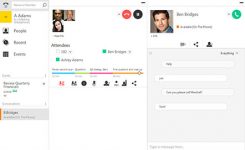Voice
Planning for Adversity Ensuring business communication continuity with the cloud
How to ensure business communication continuity with the cloud
Your new marketing campaign was a huge success and your office is receiving the highest level of calls you’ve ever experienced in your growing business. Your staff is taking live calls, checking voicemail and returning customer inquiries as fast as they can. Can you imagine the impact if your phone system goes down mid-morning – at the peak of the call volume? Who knows why disaster strikes? It could be a clumsy utility worker, a lightning storm or some other unpredictable problem. Phone system issues are a reality with traditional telecommunications systems and can create enormous business headaches for you. If your business hasn’t planned for adversity with a disaster or redundancy plan, those kinds of communication failures can significantly disrupt your business from, well, doing business.What is your business communication continuity plan?
In the past, developing a disaster recovery plan meant that your IT staff would need to re-engineer your business phone system so it could be recovered successfully. If you’re a growing business, you likely don’t have that kind of unlimited resources for equipment and infrastructure. This is where cloud communication can help. Cloud phone systems have greatly advanced system recovery and business continuity in the face of an outage. They’re hosted virtually, so there’s no need to worry about the types of disastrous scenarios that used to disrupt on-premise or landline phone services. If a phone line is cut, cloud-based systems are totally unaffected. If Internet service goes down, phone calls can be re-routed to backup cell phone numbers or other business offices.3 Essential Business Benefits of Switching to the Cloud
As you think about a continuity plan for your phone system, there are several important benefits to the cloud that you want to consider.- Your phones stay up and running – always. Even if a total outage strikes, wiping out your office’s power and Internet service, cloud-based phone systems allow employees to connect from anywhere — their home, a coffee shop, or wherever they can tap into power and a data connection.
- Redundancy is built into the architecture in all the applications. This means that the system isolates any issues and the redundancy allows you to troubleshoot during business hours rather than coming in after-hours.
- Cloud-based phone systems are completely scalable. If you need to re-direct call flow from one site to another, it’s very easy to do without any disruption in call quality or service.








